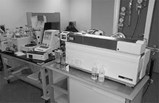Advanced Bioanalytical Services, PE Biosystems will jointly Develop Miniature LC/MS Interface

Miniaturized ESI mass spectrometry also provides improved selectivity and information content versus spectrophotometric detection. ABS chief operating officer Tom Kurz points out that UV and fluorescence detection are more sensitive than MS, but that "mass spectrometry is much more specific since spectrometric detection don't differentiate one molecule from another. MS's accuracy and analytical precision is better since it provides information on molecular structure, particularly through quantitation of molecular weight and molecular fragmentation." Kurz continued, "Miniaturization is a very powerful strategy for increasing throughput and reducing cost, especially lowering reagent costs and preserving precious sample in proteomic studies."

Advanced Bioanalytical Services performs analytical work for many of the top pharmaceutical companies, with an emphasis on mass spec services. Pictured here is ABS's PE SCIEX API 3000 mass spectrometer.
ABS and PE will initially design the device to interface with PE Biosystems' Mariner ESI/time-of-flight mass spectrometer, and at some point benefit users of all PE Biosystems LC/MS platforms, particularly for drug discovery markets such as pharmacogenomics and proteomics.
Jack Henion, co-founder, president, and CEO of ABS commented, "We believe the LC/MS device will provide a tremendous improvement in high-throughput mass spectral analyses for analyzing pharmaceutically important compounds in a faster, better, and cheaper format."
Putting electrospray nozzles on a chip makes nozzle arrays possible, providing lots of flexibility. Plus the products will be usable with almost any existing MS instrument, either as-is or with minor modifications.

ABS uses a wide array of MS and interface instrumentation. Pictured here is a Micromass Quattro II Mass Spectrometer with Perkin Elmer Series 200 Autosampler and Shimadzu HPLC gradient system.
ABS was founded in 1993 to conduct LC/MS analyses to support drug discovery and development programs for the pharmaceutical industry. By focusing on this technology, ABS has established one of the most competent, responsive, and advanced LC/MS laboratories in the world. Henion is credited with several major technology innovations in the area of LC/MS, most notably the invention of ion spray in the 1980s, which finally enabled coupling LC and MS.
ABS provides analytical services to 16 of the world's 25 largest pharmaceutical companies and is developing electrospray LC/MS technology for drug discovery applications. The company employs a staff of 67, including about 40 scientists.
For more information: Tom Kurz, General Manager and Chief Operating Officer, Advanced Bioanalytical Services Inc., 15 Catherwood Rd., Ithaca, NY 14850. Tel: 607-266-0665. Fax: 607-266-0749.
By Angelo DePalma
